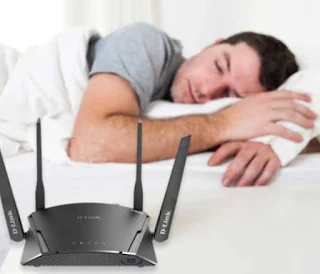In today's hyperconnected world, where Wi-Fi is omnipresent, it's easy to overlook the potential impact of leaving it on overnight while we sleep. However, there are several compelling reasons why turning off Wi-Fi during bedtime can be beneficial for both our health and well-being. Below are some key points explaining why it's advisable to switch off Wi-Fi at night:
5 Key Points to Turn Off Wi-Fi While Sleeping
1. Electromagnetic Radiation: Wi-Fi routers emit electromagnetic radiation, albeit at low levels. Prolonged exposure to this radiation, especially during sleep when our bodies are in a state of repair and regeneration, may have adverse health effects. Some studies suggest a possible link between long-term exposure to electromagnetic fields and health issues like sleep disturbances, headaches, and reduced melatonin production.
2. Improved Sleep Quality: According to research results, exposure to artificial light, including blue light emitted by electronic devices such as Wi-Fi routers, can disrupt the body's circadian rhythm. It may also suppress the production of melatonin, a hormone that regulates sleep-wake cycles. By turning off Wi-Fi at night, we reduce our exposure to artificial light, thereby promoting better sleep quality and overall health.
3. Reduced Energy Consumption: Leaving Wi-Fi routers on 24/7 consumes unnecessary energy, contributing to higher electricity bills and environmental impact. By turning off Wi-Fi at night, we conserve energy and reduce our carbon footprint, aligning with sustainability efforts and promoting eco-friendly habits.
4. Enhanced Security: Keeping Wi-Fi networks active overnight exposes them to potential security risks, such as unauthorized access or cyberattacks. Turning off Wi-Fi when not in use, particularly during sleeping hours when devices are typically idle, adds an extra layer of security and mitigates the risk of data breaches or intrusions.
5. Promotion of Healthy Habits: Turning off Wi-Fi at night encourages a healthy bedtime routine and helps establish boundaries between technology use and restorative sleep. It fosters mindfulness around our digital habits and promotes unplugging from screens, which is essential for mental well-being and stress reduction.
In conclusion, while the convenience of constant connectivity provided by Wi-Fi is undeniable, there are compelling reasons to consider turning it off at night while sleeping. Doing so can mitigate potential health risks associated with electromagnetic radiation, improve sleep quality, conserve energy, enhance security, and promote healthy digital habits. By adopting this simple practice, we can prioritize our health, well-being, and environmental sustainability in the digital age.
